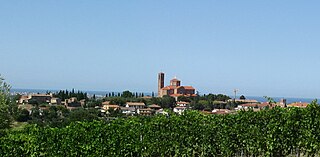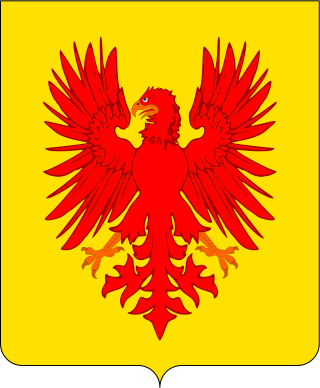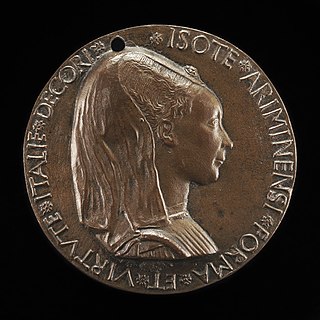
Federico da Montefeltro, also known as Federico III da Montefeltro KG, was one of the most successful mercenary captains (condottieri) of the Italian Renaissance, and lord of Urbino from 1444 until his death. A renowned intellectual humanist and civil leader in Urbino on top of his impeccable reputation for martial skill and honour, he commissioned the construction of a great library, perhaps the largest of Italy after the Vatican, with his own team of scribes in his scriptorium, and assembled around him a large humanistic court in the Ducal Palace, Urbino, designed by Luciano Laurana and Francesco di Giorgio Martini.

The House of Montefeltro is the name of a historical Italian family who ruled Urbino and Gubbio and became Dukes of Urbino in 1443. The family extinguished in the male line in 1508 and the duchy was inherited by the Della Rovere family.

Fano is a town and comune of the province of Pesaro and Urbino in the Marche region of Italy. It is a beach resort 12 kilometres southeast of Pesaro, located where the Via Flaminia reaches the Adriatic Sea. It is the third city in the region by population after Ancona and Pesaro.
Malatesta may refer to:

Sigismondo Pandolfo Malatesta was an Italian condottiero and nobleman, a member of the House of Malatesta and lord of Rimini and Fano from 1432. He was widely considered by his contemporaries as one of the most daring military leaders in Italy and commanded the Venetian forces in the 1465 campaign against the Ottoman Empire. He was also a poet and patron of the arts.

Francesca da Rimini or Francesca da Polenta was a medieval noblewoman of Ravenna, who was murdered by her husband, Giovanni Malatesta, upon his discovery of her affair with his brother, Paolo Malatesta. She was a contemporary of Dante Alighieri, who portrayed her as a character in the Divine Comedy.

The House of Malatesta was an Italian family that ruled over Rimini from 1295 until 1500, as well as other lands and towns in Romagna and holding high positions in the government of cities in present-day Tuscany, Lombardy and Marche. The dynasty is considered among the most important and influential of the Late Middle Ages. In the period of maximum influence, they extended their domains along the Marche coast, up to Ascoli Piceno, Senigallia, Sansepolcro and Citerna, and to the north, on the territories of Bergamo and Brescia.

Coriano is a comune in the province of Rimini. This town is known for being the town of the Motorcycle World Champion, in 250cc class, Marco Simoncelli.
Pandolfo I Malatesta, son of Malatesta da Verucchio, was an Italian condottiero and Lord of Rimini from 1317.

Roberto Malatesta was an Italian condottiero, or mercenary captain, lord of Rimini, and a member of the House of Malatesta.
Carlo I Malatesta was an Italian condottiero during the Wars in Lombardy and lord of Rimini, Fano, Cesena and Pesaro. He was a member of the powerful House of Malatesta. Carlo's wife was Elisabetta Gonzaga; they were married in November 1386. Francesco I Gonzaga married Carlo's sister Margherita Malatesta in 1393, cementing ties between the families. Carlo was the brother of Pandolfo III and Andrea Malatesta, with whom he fought in numerous occasions.
Malatesta II Malatesta, best known as Guastafamiglia was an Italian condottiero and lord of Rimini.
Francesca da Rimini, Op. 4, is an opera in four acts, composed by Riccardo Zandonai, with a libretto by Tito Ricordi II, after D'Annunzio's play Francesca da Rimini. It was premiered at the Teatro Regio in Turin on 19 February 1914 and is still staged occasionally.

The da Polenta family or Polentani was an old Italian noble family whose name derives from the Castle of Polenta near Bertinoro in Romagna.
Malatesta Malatesta may refer to:

Paolo Malatesta, also known as il Bello, was the third son of Malatesta da Verucchio, lord of Rimini. He is best known for the story of his affair with Francesca da Polenta, portrayed by Dante in a famous episode of his Inferno. He was the brother of Giovanni (Gianciotto) and Malatestino Malatesta.
Ferrantino Malatesta was a lord of Rimini and several other lands in northern Italy, a member of the Malatesta family.
Galeotto I Malatesta (1299–1385) was an Italian condottiero, who was lord of Rimini, Fano, Ascoli Piceno, Cesena and Fossombrone.

Isotta degli Atti was an Italian Renaissance woman and regent. She was the mistress and later wife of the condottiero and lord of Rimini, Sigismondo Pandolfo Malatesta. She governed Rimini as regent during the excommunication of Malatesta in 1460-62, as well as during the minority of their son in 1468–69.
Pandolfo is the Italian form of the masculine given name Pandulf. Notable people with the name include: